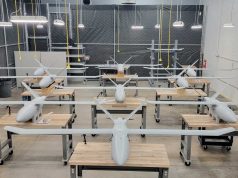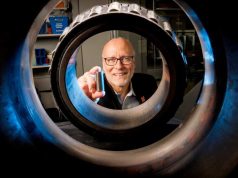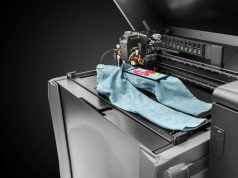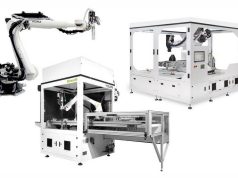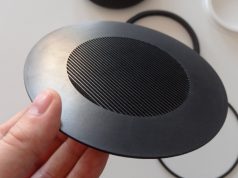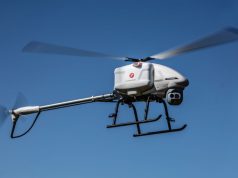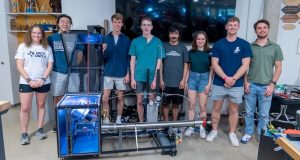Impact Innovations GmbH demonstrated its unique Cold Spray Additive Manufacturing (CSAM) process for Ti-6Al-4V using N2 as propelling gas. The Cold Spray Additive Manufacturing technology is particularly attractive for the manufacturing of large parts, which are challenging for today’s powder bed fusion-based 3D printing processes due to equipment size limitations or protective atmosphere necessity, especially when depositing reactive materials such as Ti-6-4.
In Cold Spray Additive Manufacturing (CSAM) up to now Ti-6Al-4V was considered as one of the most challenging materials, due to the high critical velocities of the materials to overcome during the deposition process, which resulted in porosities in the cold spray deposits of 3% and higher. The recently developed CSAM process utilizing the unique combination of cold spray hardware, process parameters & post treatment procedure achieved porosity levels <0,5% and final mechanical properties exceeding the requirements given by the ASTM F3001, ISO 5832-3 and AMS 4930 standards.
In contrast to other additive manufacturing technologies, powder particles are not melted during the Cold Spray process. The bonding occurs due to plastic deformation. Since Cold Spray does not require high temperatures, unlike other common technologies such as laser, electron beam or wire-arc based processes, it enables deposit components without the necessity of using any protective atmosphere with almost no dimensional limitation and in the absence of thermal residual stresses. The Ti-6-4 material efficiency from powder to deposit is more than 98%.
Impact Innovations GmbH decided to demonstrate its new CSAM process by building a Ti-6Al-4V freestanding turbojet aircraft engine fan shaft. The fan shaft is 380mm long and has in its widest place 223mm diameter. It was deposited in about 2h at deposition rate of 2,7kg/h. the net weight of the fan shaft after final machining is 3,2kg.
The fan shaft was deposited onto a pre-machined Al alloy mandrel, which was removed after the Ti-6Al-4V deposition by chemical dissolution. Subsequently, the fan shaft demonstrator underwent dedicated post treatment processes to achieve the desired mechanical properties, followed by turning to the final outer design and creating the additional features by other conventional subtractive manufacturing processes.
The Ti-6Al-4V alloy is typically used in marine and defence applications, for manufacturing aerospace structural parts, gas turbine components and biomedical implants and prostheses.
For more information about Impact Innovations GmbH, visit impact-innovations.com.
Subscribe to our Newsletter
3DPResso is a weekly newsletter that links to the most exciting global stories from the 3D printing and additive manufacturing industry.





